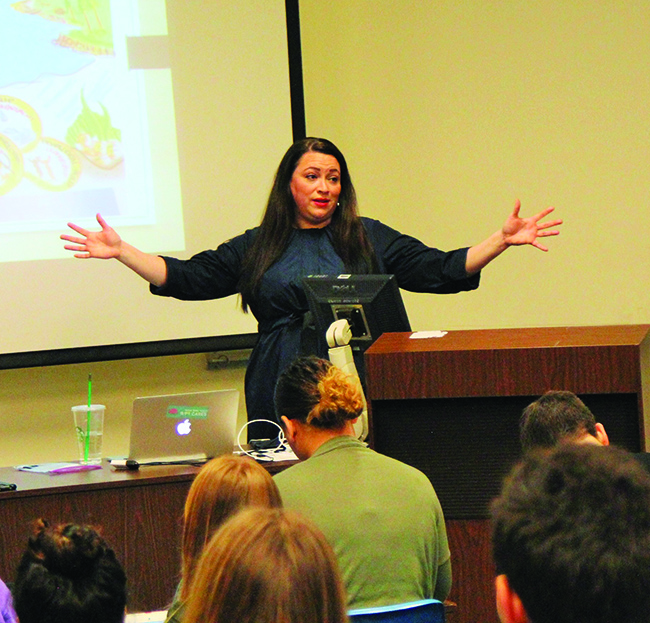
By Micheal Rios, Tulalip News
Stephanie Fryberg, Associate Professor and Tulalip tribal member, is currently teaching a class at the University of Washington under the department of American Indian Studies. Introduction to American Indian Contemporary Issues and Social Issues is a 50-student class that discusses topics like identification, child welfare, government relations, treaty rights, and Indian gaming.
It’s one thing to read textbooks and scholarly articles about tribal histories, governments and the way of life on reservations, but no amount of research will be as perceptive as first-hand accounts from tribal members who know the intricate and complex systems that make-up the day-to-day operations of a Native community. That is why Stephanie extended an invite to Misty Napeahi, Tulalip Tribes General Manager, to be a guest speaker for the class. Misty accepted and gave an insightful presentation to the collegiate students on Monday, April 10.
In a fascinating tactic, Misty began her presentation by wanting to give the students just a small glimpse into what tribal people have gone through and continue to go through today. How it worked was each student wrote down the three most important things in their lives, three things each individual felt they could not live without. Most common answers were family, faith/spirituality, knowledge, and friends. Misty then asked for the paper students wrote their answers on and in dramatic fashion she tore up the papers and threw them in the trash.
Misty explained to the students that they just willfully handed over the things they felt were most important in their lives to an authority figure who then deemed those things unimportant and trash. Student expressions of shock and frustration were priceless as they realized the subtleties of what just occurred.
“This exercise is supposed to make you think and feel uncomfortable. It shows you how indigenous people feel almost every day,” explained Misty to her captive audience. “When I was asked to speak about contemporary issues in the workforce for the Tulalip Tribes this exercise came to mind. This is what I deal with on a daily bases, people and employees who have had family members and friends taken away, people who have been told their religion is savage and barbaric.
You all have read about historical and generational trauma, but we live it. Where I’m from and where I work, we can see and feel it on a near daily basis. Issues like domestic violence and drug addiction are a symptom of all the trauma we have gone through, that our parents and grandparents went through when they were stripped of their families, language, and religion. The traumas makes people feel powerless and that powerlessness can carry on for generations.”
Following the opening exercise, Misty went on to explain how out of the ashes of all destruction and traumas Native people went through they endured and grew to govern themselves. Using the Tulalip Tribes as her example, the students became aware of the transitions that the tribe has gone through to get where it is at today. Topics included the tribal preference code for employment, TERO, the diversity of departments that compose Tulalip’s government, and the delicate systems at work when it comes to a tribal community (where everyone knows or is related to so many others) creating a workforce of countless interpersonal relationships.
There were plenty of opportunities for the inquisitive students to ask questions and for more information on issues that peaked their interest. Misty was very honest and detailed in her responses.
Three UW students shared their immediate thoughts after witnessing General Manager Misty Napeahi give her thought provoking and informationally rich presentation.
“I thought it was great. It touched on all the things that you don’t really see, but you know are probably occurring on the reservation,” said 22-year-old Collin Youngblood.
Third-year student Harneet Grewal shared, “I thought it was really eye-opening. She spread a lot of awareness to what Native people have gone through in the past, but also what they are going through currently. To consider what a person is going through, from their family and what their mental health and background may be is so different from Western culture.”
Kenia Diaz, also a third-year student added, “I thought it was very interesting overall. Like our professor said, she is not capable of giving us the insights that the General Manager of the tribe can. I feel like the reservation itself, the way it’s governed is like a family and I really like that. That type of community is awesome because people are willing to build each other up and empower one another.”